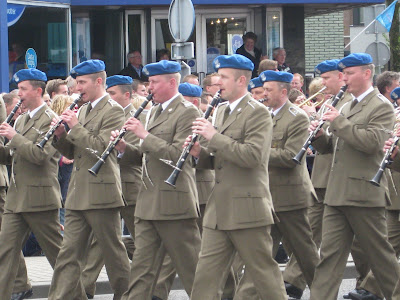A really profound day.
May 5th in Holland. Every year, dozens of cities throughout the country honour the freedom that became official on May 5, 1945 as Allied forces liberated the country.
In particular, Canadian soldiers played the primary role in the months and days leading up to the liberation (although Britain, the US, and a number of other countries' soldiers also sacrificed immensely). Also honoured on this day are veterans and peacekeepers from all wars since WWI - some are seen below.
It's just unreal how the Dutch pass this gratitude on to the next generations - kids are taught early on in school just what happened, and to this day Dutch families tend to the gravesites of soldiers who died here. I doubt there are any countries that do a better job of expressing gratitude and educating their kids about what happened in those dark years.
I saw it firsthand in the town of Wageningen, about an hour's drive from Amsterdam, where a parade lasting over two hours took place and where the Hotel de Wereld sits. It was here that the terms of surrender were negotiated and signed on May 6th 1945 between the Germans and Canadian General Charles Foulkes.
General Foulkes and the official surrender, May 6 1945
My parents were aged 11 and 8 at the time that the war ended. They had endured the
bombardment of Rotterdam and a life under years of war that I couldn't imagine. They still don't talk about it much, but I often remember this very fact when I feel like complaining about something. I have heard some of what they had to endure, from my grandfather being taken away for 3 years to eating
tulip bulbs, and it's an instant reality check.
So this day felt intensely personal - aside from the dual connection to the Netherlands and Canada, I have often asked myself the uncomfortable question: Who knows, with a bomb placed elsewhere or with a later liberation date, what might have happened to my own parents and ultimately to my own existence? Dude.
To see these 80- and 90-year-olds still marching and hearing the roar of the the crowd as they passed by, I felt fiercely patriotic about the Canadian involvement and deeply humbled, almost embarrassed at the same time. After all, I had nothing to do with the heroism of those years and I feel a lot like an undeserving beneficiary of the goodwill that the Dutch still show towards Canadians today.
Back in Canada and the Allied countries, we rarely get to feel just the immense impact that the soldiers actions had on an entire country. Hopefully this post and these pictures illustrate some small part of it.
(For another review of this special day, please click
here)





































